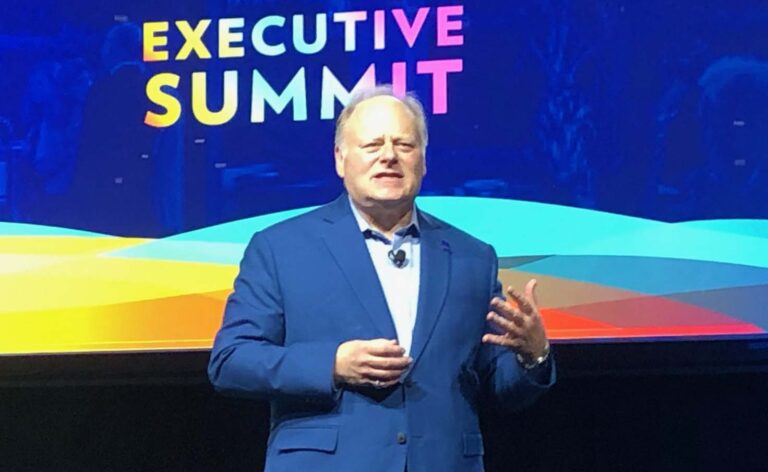
The president and chief executive officer of Himss, Hal Wolf, opened the executive summit at HIMSS25.
Photo: Susan Morse, Healthcare Finance News, HIMSS
HIMSS25 Executive Summit: Embracing AI in Healthcare
Las Vegas – The HIMSS25 executive summit commenced today, led by Hal Wolf, the president and CEO of the Healthcare Information Management and Systems Society (HIMSS). The event aims to bridge the gap between healthcare professionals and AI integration, focusing on effective change management within organizations.
The Growing Importance of AI in Healthcare
Artificial Intelligence (AI) has emerged as a key concern for health executives and industry leaders attending HIMSS25. During the summit, Bob Garrett, CEO of Hackensack Meridian Health, engaged the audience by questioning the pace of AI implementation in their organizations. The audience’s response highlighted a common sentiment: many feel that advancements in AI are not progressing quickly enough.
Survey Insights from Healthcare Executives
According to Garrett, national statistics reveal that four out of ten healthcare leaders believe AI is being adopted too slowly, while one in three feels the current pace is acceptable. This data reflects a widespread desire for faster integration of AI technologies in healthcare settings, which could significantly enhance patient care and operational efficiency.
Innovative Approaches at Hackensack Meridian Health
Garrett emphasized Hackensack Meridian’s commitment to a measured approach in AI implementation. The organization considers various factors before adopting new technologies, such as disease prevention, capacity management to mitigate professional burnout, and aligning patients with the appropriate clinical trials. His focus is on generating real results within one to three years, rather than long-term projections.
The Impact of AI on Cancer Detection and Chronic Disease Management
AI advancements are already demonstrating tangible benefits, particularly in breast cancer detection, where technology can identify tumors earlier than traditional methods. Moreover, robotics have played an increasing role, currently assisting in 17% of general surgeries, a trend expected to rise with the aging population. Garrett highlighted the potential of AI to transform the management of chronic diseases, such as chronic kidney disease, which often goes undiagnosed despite accounting for substantial healthcare costs.
Looking to the Future: AI Agents in Healthcare
The rapid evolution of AI invites speculation about future regulatory considerations. Garrett foresees a landscape where AI agents will manage patient directives, including prescription reminders and other health management tasks, thus enhancing patient engagement.
The Human Element in Healthcare Technology
Despite the advancements in AI technology, Garrett reminds us that “technology cannot replace the human touch.” He advocates for a balanced approach where technology complements human interactions, ultimately improving patients’ quality of life. The combination of AI and empathetic patient care could redefine healthcare delivery in the coming years.
For more information, contact the author at Smorse@himss.org.

